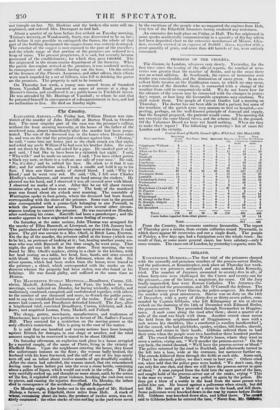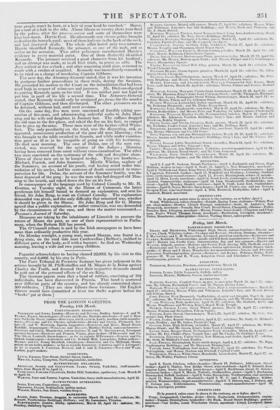IRELAND.
KNOCKTOPHER MURDERS.—The first trial of the prisoners charged with the cowardly and atrocious murders of the process-server Butler, and the policemen, at Knocktopher, took place on Thursday last week. There were ten prisoners arraigned, and one, named, John Kennedy, tried. The number of Jurymen amounted to seventy-five in all; of whom forty-two were challenged for the Crown and twenty-one for the prisoner,—one of the latter, a magistrate, for cause. Of the Jury finally impanelled, four were Roman Catholics. The Attorney-Ge- neral conducted the prosecution, and Mr. O'Connell the defence. The principal witness was Peter Harvie, the police-sergeant. He described the murder with great minuteness. Harvie was on duty on the 14th of December, with a party of thirty-five or thirty-seven police, com- manded by Captain Gibbons, who left Kilmaganny at ten or eleven o'clock on the morning of the 14th of December with Edmond Butler, the process-server. They proceeded through Newmarket to Huggins- town. A mob came along the road after them ; about a quarter of a mile of the road was black with them. Another crowd came across the field from the neighbourhood of Hugginstown. A man with a sash across his shoulders, like a comforter [a woollen handkerchief ], led the crowd, who had pitchforks, spades, scythes, bill-hooks, shovels, hammers, and stones in their hands. Gibbons ordered them to load their arms when the people were two hundred or three hundred perches off. The crowd followed them to Walsh's house, where they went to serve a notice, crying out, " We'll murder the process-server." On the way back, the crowd shouted, " We'll have the process-server or blood." The police returned by the road to Rockhall, . and afterwards turned to the left into a lane, wide at the entrance, but narrower further on. The crowds followed them through the fields at each side. Some said, " Don't be alarmed, police, we don't want to hurt you." Others cried out, when told that the police guns were loaded, " We don't care, they can only fire one shot, and then we will have the process-server in spite of them." A man jumped from the field into the open part of the lane, and caught hold of the process-server out of the ranks, crying " This is the man we want." Butler was pulled in again by the police. He then got a blow of a wattle in the head from the same person who pulled him out. He leaned against a policeman when struck, but did not fall. He next got a blow of a stone in the head, and fell there. Some policemen were knocked down in the rear by stones before Butler fell. Gibbons was knocked down also, and killed there: The crowd said to Gibbons before he entered The lane; “Nerertear, Mr. Oibbonsi your people won't be hurt, or a hair of your bead be touched." Harvie got a stab of a fork in the side. About fifteen or twenty shots were fired by the pollee, after the process-server and some of themselves were knocked down. Harvie fired. He afterwards saw eleven police brought in dead to the barrack-yard : most of them had cuts in the back of the neck, and had fractured skulls. The whole affair lasted only two minutes. Harvie identified Kennedy, the prisoner, as one of the mob, and as active on the occasion. Two other policemen corroborated Harvie's evidence in every material point. One of them distinctly identified Kennedy. The prisoner received a good character front his landlord ; and an attempt was made, as in all Irish trials, to prove an alibi. The Jury retired at five o'clock ; and after remaining until nine, returned to court with a verdict of acquittal. Kennedy was immediately remanded, to be tried on a charge of murdering Captain Gibbons. The next day, the Attorney-General stated, that it was his intention to postpone further proceedings in these trials, during the Sessions. He grounded his motion to the Court on the intimidation that had been used both in respect of witnesses and jurymen. Mr. Dickson objected to putting Kennedy again on his trial. It was neither just nor legal to put him in peril of his life a second time. The Attorney-General stated, that Kennedy would only be arraigned pro forma for the murder of Captain Gibbons, and then discharged. The other prisoners are to be detained, without bail, until next sessions. On the same day, five men were convicted of forcibly taking pos- session of fire-arms, and administering unlawful oaths to John Man- ning and his wife and daughter, in January last. The ruffians dragged the old man to the fire-place, and raked the fire on his feet, to compel him to give up the arms. These men were of the faction called White- feet. The only peculiarity on the trial, was the disgusting, and, as appeared, unnecessary production of the poor old man Manning ; who was brought to the table swathed in flannels, and while under examina- tion grew so ill as to be incapable of going on with his testimony. He died next morning. The case of Dolan, one of the men con. victed, was reserved for the opinion of the Judges ; Manning having been removed from court without cross-examination. The other two were convicted on the testimony of the wife and daughter alone. Three of these men are to be hanged to-day. They are brothers,- Michael, Patrick, and John Summers. Martin Whelan, nephew of the Summers, on account of his youth, and having acted under inti- midation of his uncles, had -his sentence of death commuted to trans- portation for life. Dolan, the servant of the Summers' family, was the most depraved of the gang : he was the man who had dragged old Man- ning to the hearth, and raked down the fire on his feet. In consequence of the language used by Colonel Conolly to Mr. H. Grattan, on Tuesday night, in the House of Commons, the latter gentlemanfelt himself bound to demand an explanation, and sent his friend, Sir John Byng, to wait on Colonel Conolly. The explanation demanded was given, and the-only difficulty that remained was, whether it should be given in the House. Sir John Byng and Sir G. Murray agreed that a public explanation, or rather retraction, was not demanded by the circumstances of the case, and there the matter terminated.- Freeman's Journal of Saturday.
Measures are taking by the inhabitants of Limerick to procure the return of Moore the poet, as one of their representatives in Parlia- ment, when the Reform Bill has passed. The O'Connell tribute is said by the Irish newspapers to have been more than ordinarily productive this year. On Monday sennight, a young man, named Morgan, was found in a dying state, on the road side near Castlewellan (Belfast), stabbed in different parts of the body, as if with a bayonet : he died on Wednesday morning, leaving a wife and two young children.



























 Previous page
Previous page